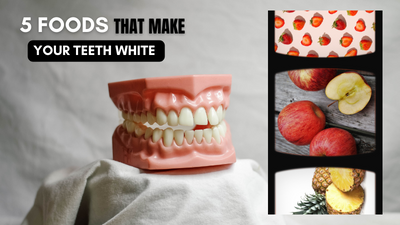Incorporating these foods into your diet will help you flash
a more radiant grin thanks to their inherent benefits. White foods are
considered to be the "good guys" and are included in the "white
diet." Eat only white foods and consume white beverages to keep your teeth
looking white. Yellowing of teeth can be prevented by avoiding acidic, dark
foods and beverages.
Here are 10 can-help foods that whiten teeth and some suggestions for how to simply add them to your diet if you're interested in altering your diet to include foods that promote oral health.
1. Apples
It's not just the dentist who benefits from eating an apple a day. Apples contain malic acid, a component found in several brands of toothpaste. Incorporating apples into your oral hygiene routine is a win-win: the abrasive characteristics of apples make them great for cleaning teeth while you snack. Apple chewing stimulates saliva production, which aids in tooth cleaning.
2. Pineapple,
Vitamin C, one of the pineapple's many wonderful vitamins,
has been shown to strengthen gums and provide protection against gingivitis.
Because it contains bromelain, the only naturally available source of this
enzyme. Eating this delicious fruit can help whiten teeth and break up plaque
due to the presence of bromelain, which has anti-inflammatory and cleaning
qualities.
3. Broccoli
Broccoli has been shown to minimize oral irritation due to
its high fiber content. Iron is another key component, as it forms a barrier
that prevents acidic foods and drinks from penetrating and damaging tooth
enamel. Broccoli, like apples, has an abrasive quality, so eating it is a good
way to clean your teeth.
4 - Strawberries
The beautiful crimson color of this fruit belies the natural
bleaching and vitamin C power it contains. Drinking strawberry juice may help
remove coffee stains from teeth, according to a study published in the Journal
of Dentistry. Consuming more strawberries may help those with teeth discolored
by coffee and other dark beverages.
5. Cheese
Cheese is beneficial to dental health and tastes great on
just about anything. Bones and teeth benefit greatly from the calcium and
phosphorus found in cheese. Casein and whey, two unique proteins, help repair
tooth enamel. Moreover, the lactic acid in cheese can prevent tooth decay. As
if we needed an excuse to load up on dairy products.
Read More: How to Whiten Teeth naturally

Comments
Post a Comment